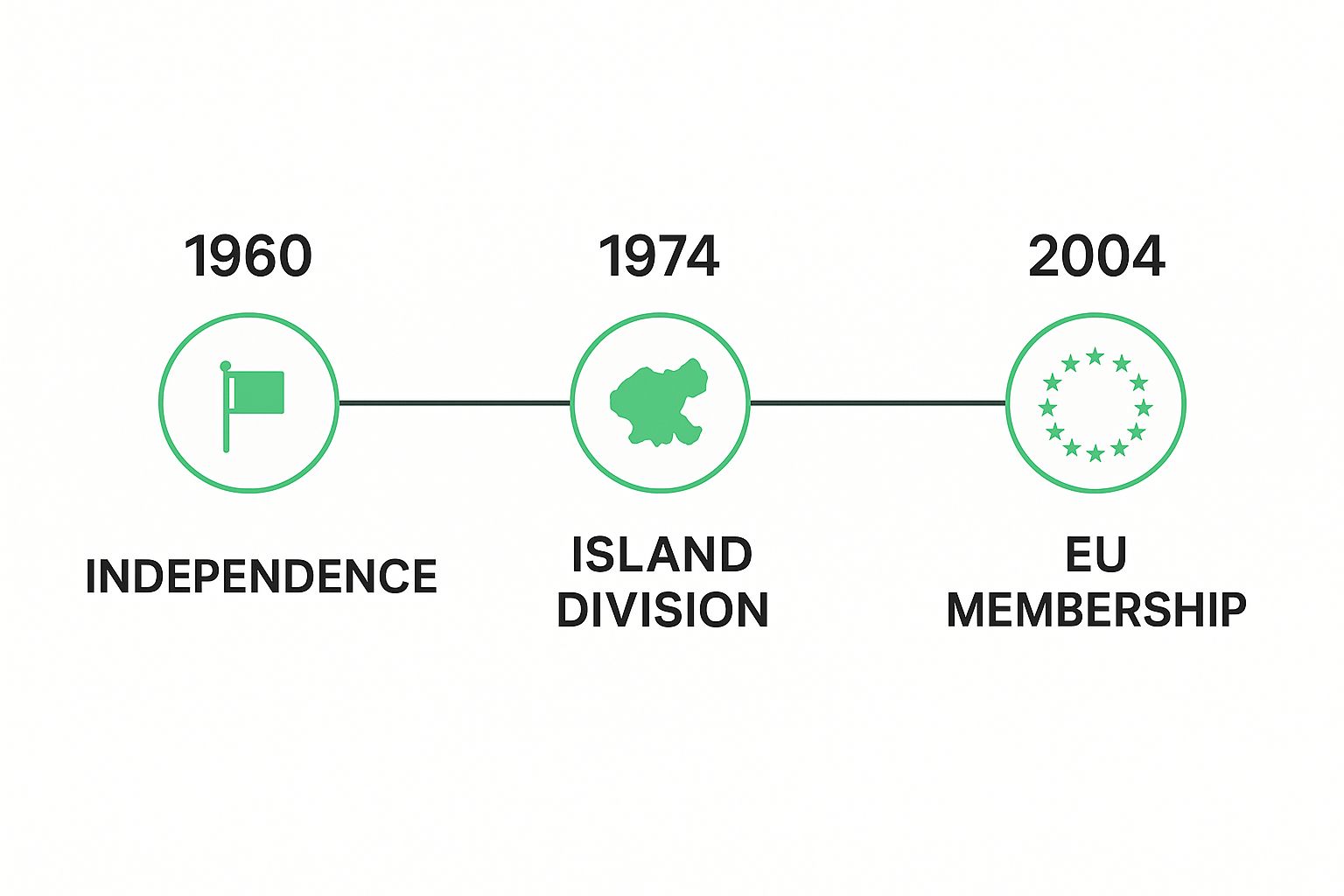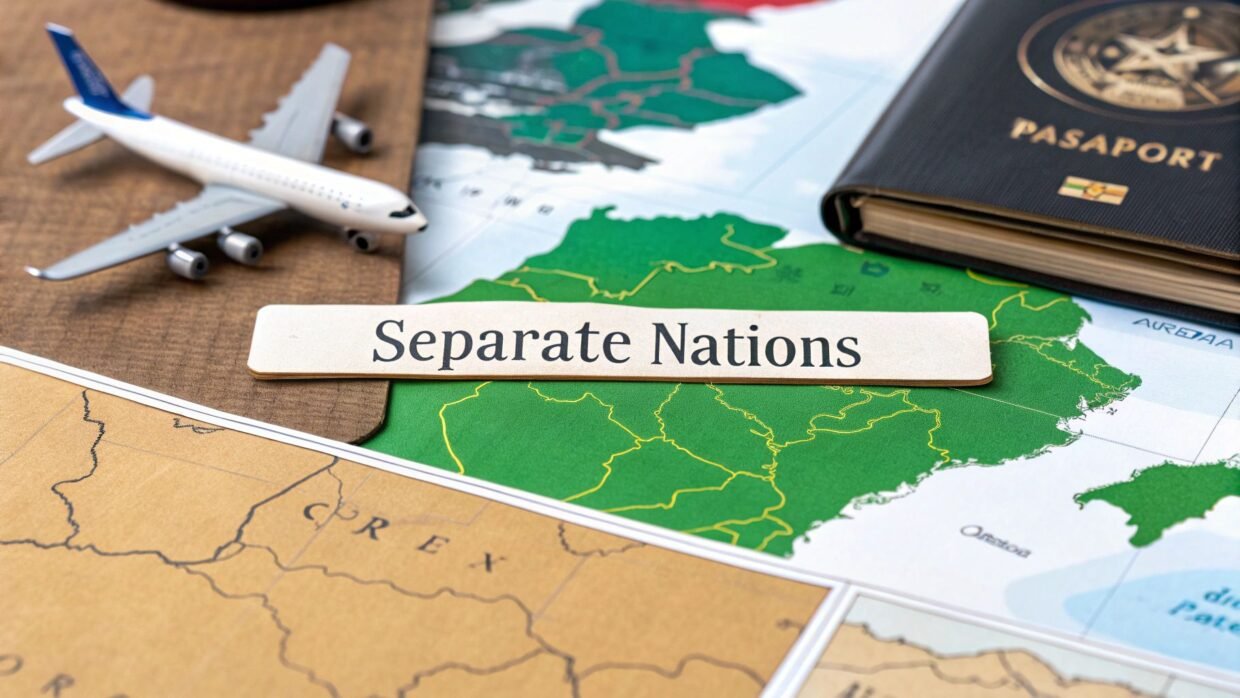Right, let's get this sorted once and for all. Is Cyprus part of Greece? The short answer is a simple, straightforward no.
Cyprus is its own independent country, officially called the Republic of Cyprus. While it’s easy to see why people get confused – the shared language, the similar flags, the sun-drenched culture – they are two completely separate nations.
So, Why the Confusion?
The confusion stems from the incredibly deep cultural, linguistic, and historical roots that connect Cyprus and Greece. Think of it like this: they're close siblings who share the same family heritage and traditions but have their own homes and run their own lives.
Both nations are proud members of the European Union, but they don't share a seat. Each has its own government, its own laws, and its own vote, which underscores their political independence on the world stage. For travellers, this means they are two distinct destinations, each with its own unique flavour despite the family resemblance.
To put it into black and white, here’s a quick rundown of how they differ.
Cyprus vs Greece At a Glance
This table should clear up any lingering doubts by comparing some basic facts about each nation.
| Attribute | Republic of Cyprus | Hellenic Republic (Greece) |
|---|---|---|
| Political Status | Independent Republic | Independent Republic |
| Capital City | Nicosia | Athens |
| Date of Independence | 1960 (from the UK) | 1821 (from Ottoman Empire) |
| EU Membership | Joined in 2004 | Joined in 1981 |
| Governance | Unitary presidential republic | Unitary parliamentary republic |
As you can see, despite all the cultural overlap, the political and historical paths of Cyprus and Greece are distinctly their own. They are allies and friends, but they are most certainly not the same country.
Untangling a Shared History and Culture

To really get why so many people wonder if Cyprus is part of Greece, you have to look past modern-day maps and dive into a rich, tangled history. The island's connection to Greece runs deep, and for millennia, Hellenic culture has been the very foundation of identity for the Greek Cypriot majority.
This isn't just a thing of the past; it’s a living, breathing bond you can feel today. They share the Greek language, the Orthodox Christian faith, and a love for the same kinds of food, music, and deeply-held family values. It’s a cultural connection so strong that it makes the two nations feel incredibly close.
A good way to think of it is like two siblings. They grew up in the same house, shaped by the same family traditions, but eventually moved out to start their own separate lives. The cultural DNA is nearly identical, but their political paths went in different directions. Our guide on where exactly Cyprus is located helps paint a clearer picture of this geographical and political separation.
The Dream of Union
This powerful sense of a shared identity once fuelled a major political movement known as Enosis, which simply means "union". Throughout much of the 20th century, the dream of unifying Cyprus with Greece was a potent force that shaped the island's politics, especially during the fight for independence from British rule.
The push for Enosis was a central cause of the 1955–1959 guerrilla war against the British colonial authorities. This complex struggle ultimately highlighted the island's unique position, leading to its creation as an independent republic in 1960 rather than becoming a part of Greece.
The road to independence wasn't straightforward. It was a careful balancing act involving Britain, Greece, and Turkey, which resulted in the birth of a sovereign Cypriot state, not a new Greek province. This history shows that even though the cultural pull towards Greece was immense, Cyprus was destined to forge its own path as a nation.
Forging a Path to an Independent Nation
So, why do people even ask if Cyprus is part of Greece? The answer lies in the island's unique modern history, which saw it chart a completely different course from Greece itself.
For 82 years, from 1878 all the way to 1960, Cyprus was actually under British administration. It started as a protectorate and later became a Crown Colony. This wasn't a short pitstop; it was a long, formative period.
During this time, the island was a vital naval outpost for the British Empire, acting as a strategic guard dog for the sea routes to India through the Suez Canal. This extended period of British rule meant Cyprus developed its own distinct political identity, legal systems, and infrastructure, all separate from Greece. Its journey wasn't about merging with a neighbour, but about moving from a colony to a self-governing nation.
This visual timeline really helps to put the key moments into perspective.

As you can see, Cyprus’s path was about establishing its own republic, navigating deep internal divisions, and eventually joining the European Union as a sovereign country in its own right.
A Negotiated Independence
Gaining independence wasn't as simple as the British just packing up and leaving. It was a carefully constructed outcome, hammered out through the 1960 Treaty of Guarantee – a landmark agreement signed by the United Kingdom, Greece, and Turkey.
This treaty is what formally established the Republic of Cyprus as a sovereign and independent state. Critically, it also designated the UK, Greece, and Turkey as "guarantor powers," giving them the responsibility of protecting the island's new status and constitution.
This legal framework provides the clearest answer to the question. As a modern nation-state, Cyprus has never been part of Greece. Its independence was an internationally brokered deal that cemented its status as a unique country.
While the cultural ties are incredibly strong, its 20th-century political history is entirely its own. You can dive deeper into this fascinating journey and the longstanding UK-Cyprus relations that played such a huge part in shaping it.
Understanding Today's Political Realities

To really get to the heart of why Cyprus isn't part of Greece, you have to look at its modern, and admittedly complex, political situation. The island's story took a sharp turn following a turbulent invasion in 1974.
Since then, Cyprus has been split by a UN-patrolled buffer zone, often called the Green Line. This line physically divides the island into two separate territories.
In the south, you have the internationally recognised Republic of Cyprus – this is the government the rest of the world officially deals with. In the north, there is the self-declared Turkish Republic of Northern Cyprus, which is recognised only by Turkey. This political reality is the single most important reason Cyprus stands alone.
European Union and Global Status
A key difference that solidifies their separation on the world stage is their membership in the European Union. While both Greece and Cyprus are proud EU members, they joined as two distinct, sovereign nations.
The Republic of Cyprus became a full member of the European Union on its own merit in 2004. This gives it its own representation, its own vote, and its own seat at the table—completely independent of Greece.
Adding another layer to its unique status, the United Kingdom has a historical role as a guarantor power, maintaining two Sovereign Base Areas (Akrotiri and Dhekelia) on the island. This ongoing British military presence underscores Cyprus's distinct geopolitical identity, separate from Greece.
This long-standing connection has also kept Cyprus very much on the radar for Brits. Awareness of the island is exceptionally high in the UK, with historical ties influencing everything from holiday destinations to property investment. It’s just one more factor that highlights Cyprus as its own country with its own unique relationships. You can learn more about the deep-rooted connections between the UK and Cyprus that remain strong today.
Practical Differences for Modern Travellers

So, what does all this mean for your holiday? While you'll feel the shared cultural DNA, the reality of travelling to Cyprus versus Greece is night and day. Knowing these practical distinctions is the key to a hassle-free trip.
For a start, even though both countries are in the Eurozone and use the Euro (€), you’re dealing with completely separate nations. A flight to Cyprus means landing at Larnaca (LCA) or Paphos (PFO), whereas a trip to Greece involves flying into places like Athens (ATH) or Thessaloniki (SKG).
Here’s a common misconception: you can't just hop on a ferry between them. Despite how close they look on a map, there are currently no regular passenger ferry services connecting Cyprus and Greece. Flying is your only real option. Our guide on how long the flight to Cyprus is can give you a better idea of the journey.
Noticing the Difference on the Ground
Once you touch down, the unique character of Cyprus really starts to shine. You'll quickly notice the distinctive Cypriot-Greek dialect. It’s the same linguistic root, but with its own accent, speed, and vocabulary that can even catch native Greek speakers off guard.
The food tells a similar story. Think of it like the culinary divide between Northern and Southern Italy—same country, very different kitchens. In Cyprus, halloumi cheese is a national icon, and you’ll find sheftalia sausages everywhere. These are Cypriot specialities, far more central to the cuisine here than on the Greek mainland. Even the pita bread is different, often a thinner, pocket-style bread, not the fluffy, thicker kind common in Greece.
The whole vibe of the island feels different too. Both cultures share that classic, relaxed Mediterranean spirit, but Cyprus has its own rhythm. It's a unique blend of its Hellenic heritage and a subtle, but noticeable, Middle Eastern influence that’s all its own.
From the airport you fly into to the food on your plate, these tangible differences are what make it clear. Cyprus and Greece may be close relatives, but they are most certainly not the same country.
Frequently Asked Questions About Cyprus and Greece
It’s easy to get tangled up in the details of the Cyprus-Greece connection. Let's clear up a few of the most common questions people have. Think of this as the final piece of the puzzle, helping you see the two countries for what they are: close family, but not the same household.
Do They Speak Greek in Cyprus?
Yes, absolutely. Greek is an official language in the Republic of Cyprus, and you'll hear it everywhere. But here’s the interesting part: it’s not the exact same Greek you'd find in Athens.
Cypriots speak their own distinct Cypriot Greek dialect. It has a unique rhythm, a different accent, and some vocabulary that would make a mainlander's ear perk up. While someone from Greece would understand it, the difference is immediately obvious.
Don't worry about a language barrier, though. English is also incredibly common across the island, a legacy of British rule, so getting around and communicating is a breeze for most travellers.
Can I Travel Between Greece and Cyprus Easily?
Getting from one country to the other is simple, but you'll need to head to the airport. There are dozens of daily flights zipping between Athens and the Cypriot airports in Larnaca and Paphos. It’s a quick and easy hop.
A common misconception is that you can just catch a ferry across. Currently, there are no regular passenger ferry services running between Greece and Cyprus. Flying is really the only practical option if you want to include both of these independent nations in one holiday.
The confusion is understandable. The two countries feel so closely linked through their shared language, Orthodox faith, and ancient history. For many visitors, the vibe of sun, sea, and fantastic food feels just like a Greek island getaway, which leads to the easy but incorrect assumption that Cyprus is politically part of Greece.
Is the Whole Island of Cyprus in the EU?
This is where things get a bit more nuanced. Officially, the entire island territory of Cyprus is part of the European Union. However, the day-to-day reality for a visitor is different.
EU law is effectively suspended in the northern part of the island, an area not controlled by the government of the Republic of Cyprus. What this means for you as a traveller is that all the benefits of EU membership – like free movement or certain consumer rights – only apply when you're in the southern part of the island.
It’s always a good idea to check the specific entry requirements before you travel. For most people, it's straightforward, as you can see in this helpful guide on getting a visa for Cyprus.
At SayCyprus, we're passionate about helping you discover every corner of this beautiful and independent island. From the best beaches to the most authentic tavernas, explore our guides and start planning your perfect Cypriot adventure at https://www.saycyprus.com.












